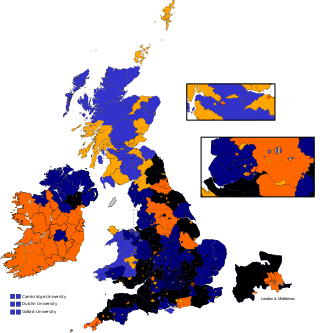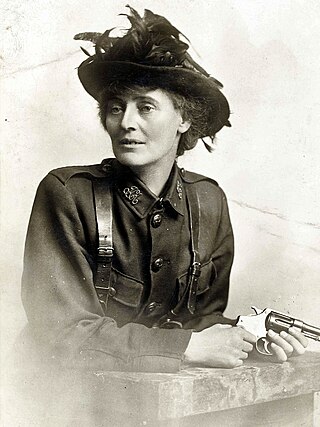
The Parliament of the United Kingdom of Great Britain and Northern Ireland is the supreme legislative body of the United Kingdom, and may also legislate for the Crown Dependencies and the British Overseas Territories. It meets at the Palace of Westminster in London. Parliament possesses legislative supremacy and thereby holds ultimate power over all other political bodies in the United Kingdom and the Overseas Territories. While Parliament is bicameral, it has three parts: the sovereign, the House of Lords, and the House of Commons. The three parts acting together to legislate may be described as the King-in-Parliament. The Crown normally acts on the advice of the prime minister, and the powers of the House of Lords are limited to only delaying legislation.

The Peerage Act 1963 is an Act of the Parliament of the United Kingdom that permits female hereditary peers and all Scottish hereditary peers to sit in the House of Lords and allows newly inherited hereditary peerages to be disclaimed.

The 1918 United Kingdom general election was called immediately after the Armistice with Germany which ended the First World War, and was held on Saturday, 14 December 1918. The governing coalition, under Prime Minister David Lloyd George, sent letters of endorsement to candidates who supported the coalition government. These were nicknamed "Coalition Coupons", and led to the election being known as the "coupon election". The result was a massive landslide in favour of the coalition, comprising primarily the Conservatives and Coalition Liberals, with massive losses for Liberals who were not endorsed. Nearly all the Liberal MPs without coupons were defeated, including party leader H. H. Asquith.
Queen's University of Belfast was a university constituency represented in the House of Commons of the United Kingdom Parliament from 1918 until 1950.
The 1921 Irish elections took place in Ireland on 24 May 1921 to elect members of the House of Commons of Northern Ireland and the House of Commons of Southern Ireland. These legislatures had been established by the Government of Ireland Act 1920, which granted Home Rule to a partitioned Ireland within the United Kingdom.

The Representation of the People Act 1918 was an act of Parliament passed to reform the electoral system in Great Britain and Ireland. It is sometimes known as the Fourth Reform Act. The Act extended the franchise in parliamentary elections, also known as the right to vote, to men aged over 21, whether or not they owned property, and to women aged over 30 who resided in the constituency whilst occupying land or premises with a rateable value above £5, or whose husbands did. At the same time, it extended the local government franchise to include women aged over 30 on the same terms as men. It came into effect at the 1918 general election.

In the United Kingdom, a member of Parliament (MP) is an individual elected to serve in the House of Commons, the lower house of the Parliament of the United Kingdom.
Cromac, a division of Belfast, was a UK parliamentary constituency in Ireland. It returned one Member of Parliament (MP) to the House of Commons of the United Kingdom from 1918 to 1922, using the first past the post electoral system.
Ormeau, a division of Belfast, was a UK parliamentary constituency in Ireland. It returned one Member of Parliament (MP) to the House of Commons of the United Kingdom from 1918 to 1922, using the first past the post electoral system.
Pottinger, a division of Belfast, was a UK parliamentary constituency in Ireland. It returned one Member of Parliament (MP) to the House of Commons of the United Kingdom from 1918 to 1922, using the first past the post electoral system.
Woodvale, a division of Belfast, was a UK parliamentary constituency in Ireland. It returned one Member of Parliament (MP) to the House of Commons of the United Kingdom from 1918 to 1922, using the first past the post electoral system.
National University of Ireland (NUI) is a university constituency in Ireland, which elects three senators to Seanad Éireann, the senate of the Oireachtas. Its electorate is the graduates of the university, which has a number of constituent universities. It previously elected members to the House of Commons of the United Kingdom (1918–1921), to the House of Commons of Southern Ireland (1921) and to Dáil Éireann (1922–1937).

The Government of Ireland Act 1920 was an Act passed by the Parliament of the United Kingdom to create two separate parliaments in Ireland: the Parliament of Northern Ireland and the Parliament of Southern Ireland. The Fifth Schedule to this act provided the constituencies for the House of Commons in these two separate parliaments. These same constituencies also replaced those provided in the Redistribution of Seats (Ireland) Act 1918 for representation of Ireland in the House of Commons of the United Kingdom at Westminster. Sinn Féin used these constituencies to elect the Second Dáil (1921–22) and those constituencies in Southern Ireland were used to elect the Third Dáil (1922–23).

Westmorland was a constituency covering the county of Westmorland in the North of England, which returned Members of Parliament to the House of Commons of the Parliament of the United Kingdom.

The Parliament Act 1918 is an Act of the Parliament of the United Kingdom. It gave women over 21 the right to stand for election as a Member of Parliament.
The 1921 Louth by-election was a by-election held on 22 September 1921 for the British House of Commons constituency of Louth in Lincolnshire.

The representation of women in the House of Commons of the United Kingdom has been an issue in the politics of the United Kingdom at numerous points in the 20th and 21st centuries. Originally debate centred on whether women should be allowed to vote and stand for election as Members of Parliament. The Parliament Act 1918 gave women over 21 the right to stand for election as a Member of Parliament. The United Kingdom has had three female Prime Ministers: Margaret Thatcher (1979–1990), Theresa May (2016–2019), and Liz Truss (2022). The publication of the book Women in the House by Elizabeth Vallance in 1979 highlighted the under-representation of women in Parliament. In more modern times concerns about the under-representation of women led the Labour Party to introduce and, decades later, abandon all-women short lists, something which was later held to breach discrimination laws.

The 1918 Keighley by-election was a parliamentary by-election held for the House of Commons constituency of Keighley in the West Riding of Yorkshire on 26 April 1918.

This is a list of women who stood in general elections to the Parliament of the United Kingdom up to and including the 1945 general election.









